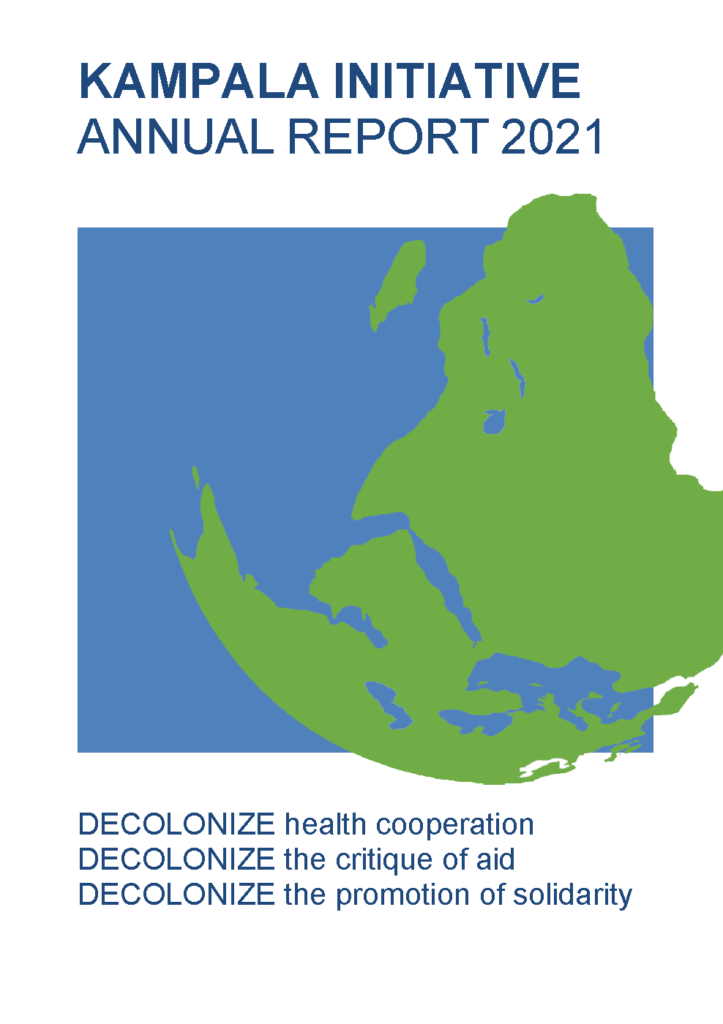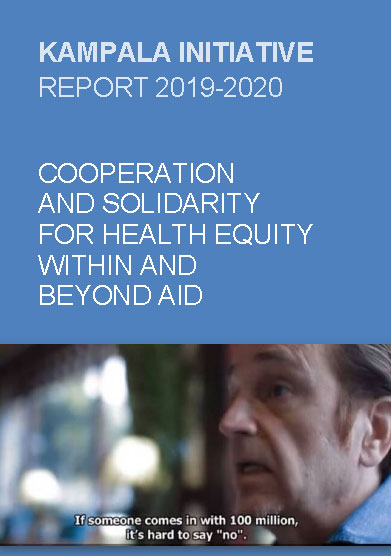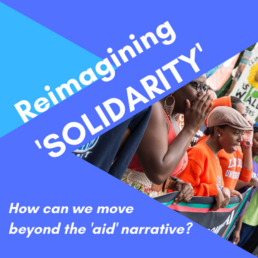For many countries and societies struggling with access to health and health equity, aid is still a challenging reality, and this reality needs to be examined and acted on: What’s wrong with “health aid” and its actors, structures, paradigms and policies, methods and processes, and how can the failures and shortcomings of aid be addressed? All in all, how to achieve cooperation and solidarity within and beyond “aid”?
The Kampala Initiative is a democratic civil society space and structure (alliance, community) of independent, critical-thinking activists and organizations across Southern and Northern boundaries.
Within this space, the critique of aid shall lead to formulating, promoting, disseminating and seeking political traction for a new, broadly shared civil society narrative on cooperation and solidarity within and beyond aid.
Kampala Initiative Report 2021
DECOLONIZE health cooperation
DECOLONIZE the critique of aid
DECOLONIZE the promotion of solidarity
What would the world look like if we opted for collective cooperation and solidarity as opposed to profit and greed?
The shortcomings of global health governance during this exhausting Covid-19 pandemic era continue to bring fresh air to our two year old baby – the Kampala Initiative. The pandemic has raised our awareness about the unjust resource distribution and socio-economic disparities whilst emphasising the value of global solidarity and cooperation in protecting and promoting health and well-being for all.
Throughout 2021, the cross-cutting issues of decolonization and challenging the aid narrative lay at the intersection of our work as alternatives to the current health aid architecture. The Kampala Initiative strives to expose, explore, challenge and transform health aid through dialogue, advocacy, activism and action. Engage!
Download PDF Kampala Initiative – Report 2021
DECOLONIZE health cooperation
DECOLONIZE the critique of aid
DECOLONIZE the promotion of solidarity
In the past two turbulent and challenging years a spotlight has been shone on emerging, hugely complex, and interlinking issues such as the Black Lives Matter movement and Covid-19, and the systemic and structural inequalities that they have exposed. Within the development sector these issues have galvanised a push for systemic change and in particular a push to advance the decolonization of the aid agenda. It is encouraging to see that going into 2021 a decoloniality movement has become more visible and vocal.
The Kampala Initiative clearly positions itself as part of the decoloniality movement.
The Kampala Initiative defines decoloniality in its work as described below, with the understanding that this working definition will be refined and elaborated on an ongoing basis, as the KI learns from its members and external participants in its engagements.
Decoloniality is concerned with the power imbalance and related effects between countries of the Global North and Global South, particularly between former colonial powers and former colonies. It differs from decolonization, which was a process that led to political independence (largely between the 1950s and 1980s), in that decoloniality focuses on the continuing effects of that colonial control over countries that are now politically independent. Those effects include structural inequities embedded in economic, trade and financial systems; migration; diplomacy, conflict and war; social systems including health and its determinants; as well as cultural influences.
Development assistance in health and other sectors has its historical and ideological roots in the colonial project, and as articulated in the Kampala Declaration, “development assistance for health – ‘aid’ – often reinforces the power imbalances that underlie health inequities”. The Kampala Initiative has advanced discussion on the transformation of health aid toward models such as global solidarity and health equity. That work is neither comprehensive nor complete, and the need to decolonize both ‘aid’ as well as its critique continues.
In 2021 and 2022, the Kampala Initiative will intensify its focus on decoloniality in relation to development cooperation for health, the promotion of solidarity, and the critique of aid.
Doing so, we can confidently refer to
- our setup as a “democratic civil society space of independent, critical-thinking activists and organizations across Southern and Northern boundaries”;
- our political platform (Kampala Declaration) and shared values;
- our ambition that “the critique of aid shall lead to formulating, promoting, disseminating and seeking political traction for a new, broadly shared civil society narrative on cooperation and solidarity for health equity within and beyond aid.”
The particular contribution and field of work of the Kampala Initiative takes on – but is not restricted to – “decolonizing development”, particularly in relation to the imbalances in power and decision-making around development assistance for health, as well as the inequities that are perpetuated as a consequence.
We further aim at decolonizing the promotion of solidarity and the critique of aid, being aware that our own field of civil society action is itself too often dominated by actors of the global North and therefore follows (neo)colonial patterns. A world of health equity is only possible through a decolonizsed lens on both conventional development as well as civil society actions to change ‘aid’.
This lens will inform activities of the Kampala Initiative, such as webinars and workshops that the KI holds or promotes.
But it has also implications for the Kampala Initiative itself,
- in the way the Kampala Initiative itself is set up as a community and civil society space, including issues of formal and informal power, governance, management and representation;
- in giving due attention to our own narrative on health aid and solidarity around health, and being clearer in our links to the decolonizing movement;
- in getting more vocal and reaching audiences beyond those already in alignment with our mission.
Doing so, we will network with other decoloniality movements in health, e.g., in the field of global health governance or health research or in the broader aid sector, in order to build alliances and to further shape and jointly advance the decoloniality agenda.
(this section is quoted from the Kampala Initiative work plan 2021. The document was shared with members via “Beyond aid” mailing list and can be ordered at the secretariat)
Kampala Initiative Report 2019-2020
COOPERATION AND SOLIDARITY FOR 
HEALTH EQUITY WITHIN AND BEYOND AID
This report is intended to provide a summary of activities and outcomes from the first year of the Kampala Initiative and to inform ideas for the future of the Initiative. It is not intended to be comprehensive nor to evaluate the Kampala Initiative and its initial progress. Nevertheless, as well as using the report for our upcoming strategic planning, we will also use it to bring the Kampala Initiative to the attention of a broader audience. Thanks to all who have contributed to bringing forward what we started in November 2019 with the “Kampala workshop on cooperation and solidarity within and beyond aid”. More to come!
Download PDF: Kampala Initiative – Report 2019-2020
Kampala Initiative Task groups
- Challenge PPPs
- Decolonizing Health in Africa
- Track Changing Initiative
- Watch the GAP (currently not active)
Kampala Initiative at a glance
- Kampala Declaration
“Cooperation and solidarity for health equity within and beyond aid”
The page also includes the list of institutional and individual members of the Kampala Initiative - Ongoing series of Kampala Initiative webinars
“Challenging realities of ‘aid” - Kampala Initiative as a community
….and the related community tools - Kampala Initiative: Governance basics and work plan 2020
These documents adopted in April 2020 have been shared with members via mailing list can be ordered at our secretariat. - History: Kampala workshop, November 2019
The launch event of the Kampala Initiative - Follow us on Twitter:
#KampalaInitiative and #BeyondAid
Thematic fields
The initial list of four thematic fields covered by the Kampala Initiative is a starting point for joint action on particular cases within these fields, and not a final or authoritative “map” of the biggest challenges in the field of aid.
Aid stabilizing or overcoming an unfair global trade regime?
The dominant postcolonial narrative of “rich donors aiding poor/fragile states” needs to be challenged, as it distracts attention (and action) from addressing the core of an unfair global trade/tax/tariff/finance regime in which the health inequity between and within countries is rooted. Critical civil society voices have called for “honest accounts” to address the incoherence of donor country policies and multilateral institutions that work against the normative values of aid in the sense of global solidarity.
Aid and its actors distorting/supporting national health policies, systems, processes
Aid and powerful international actors (from Global Health Initiatives to bilateral agencies and NGOs) have the potential to support or distort national health policies, systems, political processes. The call for alignment of aid with national policies and systems (Paris Declaration) has never led to more than lip service, and the dominant “multi-stakeholder” approach in international health partnerships perhaps contributes to a growing influence of commercial actors and their interests and political agenda and to a further reduction of the space, role and power of both national governments and people, communities and civil society.
Representation and voice(s) of civil society in global fora and processes
Civil society representation in global processes, actors and fora related to health cooperation is unequal and faces governance challenges. These need to be addressed by related institutions (in particular: Global Health Initiatives), but also by civil society: We need to sort things out among ourselves, addressing governance and power issues, moving civil society engagement beyond lip service and token representation, based on the opportunities provided by the fact that, for the legitimacy of these global processes, actors and fora, “they need us”. And if there is an agreement on the need to address these issues, how to do it concretely? How can broader civil society make its multiple voices heard, when the dominant narrative is defined by large NGOs – southern and northern – funded by institutions in the global North?
From aid to “global solidarity beyond aid”
Global solidarity can be easily called for, but what should it look like, and how can it be achieved? Some potential questions to explore could be: What does global solidarity mean to us? Is it important? What does it look like in practice? How could organisations in the Global South and North best work together? How can we achieve this? What are the barriers to achieving this? What examples are there to inspire us? Is language/framing an important part of this? What could a new narrative look like that encompasses our understanding of global solidarity?

This temporary website of the Kampala Initiative (KI) is kindly hosted by the MMI Network. We are still looking out for KI members or friends who can help us with having an “own” domain and website!
Kampala Declaration
The “Kampala Declaration on cooperation and solidarity for health equity within and beyond aid” was released on 27 January 2020, as a reference document for the Kampala Initiative, and as a means to reach out to others: Institutions and individuals are welcome to join the Kampala Initiative by endorsing the Declaration.
Kampala Initiative: Contact
- Ravi Ram, People’s Health Movement
ravimram@gmail.com - Thomas Schwarz, MMI Network
schwarz@medicusmundi.org
Challenging realities of “aid”: Series of public webinars
Start thinking about what case you would like to see featured in a next webinar, and learn more about how to do this.
- Kampala Initiative Webinars:
Challenging realities of “aid” - Series of webinars in November 2021:
“Reimagining solidarity – How can we move beyond the ‘aid’ narrative?”

Kampala Initiative as a community
The Kampala Initiative (KI) is set up and defined as “a democratic civil society space and structure (alliance, community) of independent, critical-thinking activists and organizations across Southern and Northern boundaries. A set of basic community tools of the Kampala Initiative shall help to keep this civil society space and community at the same time vivid, democratic, and relevant.
Launch of the Kampala Initiative
The “Kampala Initiative” was launched in October and November 2019 with a series of four public webinars, each of them focusing on a challenging aspect of aid and on a related case that needs or deserves particular civil society attention. The conversation on these topics was continued in a civil society workshop in Kampala that concluded with with the unanimous assessment by all participants to sustain and expand the Initiative.
The Kampala Initiative was launched by:
- African Centre for Global Health and Social Transformation (ACHEST)
- CEHURD – Center for Health Human Rights & Development
- Country Minders for Peoples Development (CMPD), Malawi
- Foundation for Integrated Rural Development (FIRD) , Uganda
- Health Poverty Action, UK
- Human Rights Research Documentation Center (HURIC), Uganda
- Initiative for good governance and transparency in Tanzania
- Medicus Mundi International – Network Health for All (MMI)
- Nigerian Women Agro Allied Farmers
- People’s Health Movement (PHM) with PHM Kenya and PHM Uganda
- Southern and Eastern Africa Trade Information and Negotiations Institute (SEATINI), Uganda
- Wemos
Since January 2020, many more organizations and individuals have joined the Kampala Initiative by endorsing the Kampala Declaration (see the lists of signatories there).
